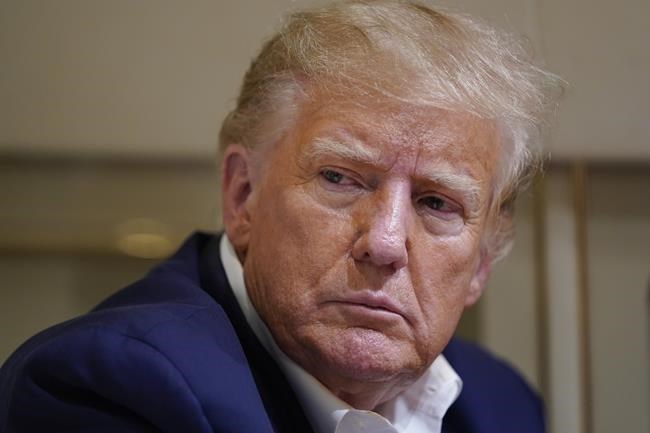WASHINGTON — The United States found itself in uncharted territory Friday, confronting the as-yet-unknown political, judicial and social repercussions of having an ex-president face criminal charges for the first time in its history.
The indictment of Donald Trump was generating far more questions than answers, thanks to the fact that it will remain sealed until the former commander-in-chief is arraigned next week in New York City.
But whatever happens, the complex executive-branch relationship between America's elected leaders and its prosecutors may never be the same.
"It is potentially terrifying," said Neama Rahmani, a former assistant U.S. attorney who now operates a personal injury practice in California.
Rahmani served in the second Bush administration under attorney general Alberto Gonzales, whose decision to abruptly fire seven U.S. attorneys in 2006 prompted charges of political interference, which Gonzales denied.
Allegations began to fly that the firings had been ordered by a White House that was frustrated with the enforcement of immigration laws. Gonzales, fiercely loyal to President George W. Bush, resigned the following summer.
At the time, "that was a huge scandal," Rahmani said. "But now, all bets are off."
Somewhere in the legal morass enveloping Trump — whether it be the Stormy Daniels case, his effort to overturn the 2020 presidential election in Georgia or inciting the Jan. 6 riot on Capitol Hill — there is likely evidence of a crime, he added.
"The evidence is there. But is this ... the beginning of the end, where we're going to prosecute a political opponent? That is terrifying."
Charges of a politically motivated prosecution have been coming fast and furious from Trump loyalists in both the Senate and the House of Representatives since long before news of the indictment broke.
The heads of three key House committees, including Trump loyalist and Judiciary Committee chairman Rep. Jim Jordan of Ohio, wrote last week to Alvin Bragg, the embattled Manhattan district attorney at the head of the investigation.
They accused Bragg of refusing to meet their demands for confidential information about the investigation, and of using federal funds to advance what they described as a politically motivated prosecution.
Bragg's own legal team responded in kind Friday.
The charges were brought by ordinary Americans, "doing their civic duty as members of a grand jury, who found probable cause to accuse Mr. Trump of having committed crimes in New York," wrote general counsel Leslie Dubeck.
The six-page letter goes on to accuse the three committee chairmen of choosing to "vilify and denigrate" state prosecutors and trial judges, and of making "unfounded allegations" of a political hit job.
"We urge you to refrain from these inflammatory accusations, withdraw your demand for information and let the criminal justice process proceed without unlawful political interference."
One of the most striking displays of Republican fealty to Trump came Thursday when red-eyed South Carolina Sen. Lindsey Graham dropped a profanity live on Fox News as he urged supporters to help their leader with his legal bills.
"This is the most irresponsible and dangerous decision by a prosecutor in the history of the country," Graham railed. "This is going to destroy America. We're going to fight back at the ballot box. We're not going to give in."
The charges flow from the Stormy Daniels affair in which so-called "hush money" payments were made during Trump's 2016 presidential campaign to silence claims of extramarital sexual encounters.
The indictment remains sealed, but Bragg's investigation has been focused on payments that were made to Daniels, an adult film star, as well as to former Playboy model Karen McDougal.
CNN has reported that Trump is facing more than 30 charges related to what the media outlet is describing simply as "business fraud." He's expected to surrender Tuesday afternoon at the Manhattan courthouse.
But those charges are probably the least of his forthcoming legal problems, said Mark Rozell, a public policy professor at George Mason University in Arlington, Va.
"Trump's presidential campaign will most likely be derailed by the accumulation of investigations, in particular the Georgia one and Jan. 6, not this indictment," Rozell said.
In the short and medium term, the indictment is likely to help Trump consolidate his support, particularly among his most loyal followers, he said.
"The accumulation of charges from multiple investigations, though, could be the turning point that leads GOP activists to abandon Trump and look to another conservative Republican to carry the movement forward."
Late in the 2016 presidential campaign, Trump's former lawyer and fixer Michael Cohen paid Daniels $130,000 to keep her silent about what she says was a sexual encounter with Trump a decade earlier.
Cohen was then reimbursed by Trump’s company, which also rewarded the lawyer with bonuses and extra payments logged internally as legal expenses. Over several months, Cohen said, the company paid him $420,000.
Earlier in 2016, Cohen had also arranged for the publisher of the supermarket tabloid the National Enquirer to pay Playboy model Karen McDougal $150,000 to squelch her story of an affair with Trump.
Federal prosecutors in New York charged Cohen in 2018 with violating federal campaign finance laws, arguing that the payments amounted to impermissible help to Trump’s presidential campaign. Cohen pleaded guilty to those charges and unrelated tax evasion counts and served time in federal prison.
The challenge for Bragg, said Rahmani, will be to undermine the likely claim by Trump's lawyers that the payments were unrelated to the campaign.
"Election law has a very broad view of a contribution — essentially, anything that helps the campaign doesn't have to be monetary, or even in kind," he said.
"Trump and his lawyers are going to argue, 'Well, this payment had nothing to do with the campaign and had everything to do with protecting Melania and my family from embarrassment.'"
This report by The Canadian Press was first published March 31, 2023.
James McCarten, The Canadian Press

